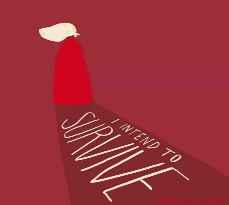Psychological Survival
This anthology is not a guide on how to survive life, or how to endure everyday experiences. This anthology is not a counsellor or therapist who will hold your hand through the bad times. It also will not be an anthology on rainbows and sunshine or something that would bring you joy. However, this anthology explores how past and present experiences suggest that the journey of Psychological Survival is an ongoing experience. It delves into the themes of abuse, isolation and mental illness, which contributes to the idea of surviving the hardships in one’s own mind. What we do promise is that this anthology will not taint or affect your mental health.
The term ‘Psychological Survival’ is split into two different terms. Psychological is ‘having a mental rather than physical cause’ (OED), while Survival is ‘the state or fact of continuing to live or exist, typically in spite of an accident or ordeal’ (OED). We combined these two terms as we felt that they defined our extracts in one overarching theme and that these extracts are artistic responses to the idea. Through researching the origins of this theme, we discovered that it is a particular genre in video games as video games attempt to challenge a player’s psyche by placing them in a given situation. Psychological Survival is thus, the fluctuating mental and emotional state of an individual person or character and how they are able to escape imprisonment within their own mind. It is how well they can deal with the obstacles that they continuously face and for some characters, the posttraumatic stress that they deal with in the aftermath.
In the 21st century, there are a lot of different texts such as novels, films, video games, songs, poems and many more that surround the topic of Psychological Survival. Although one may assume that a lot of texts dealing with Psychological Survival take place in dystopian societies, these hardships can also occur in everyday life, which can make it relatable to the reader. From the rise of awareness of mental illnesses comes recognition of Psychological Survival, as they are explored in different texts taking away the stigma. For these reasons, all the texts that have been selected are fictional and are published from the late 20th century to the present day, and they all deal with mental endurance throughout the text. Some of these extracts include the whole text, such as Miss Havisham; however, some are just a portion of a text which mainly focuses on the theme. We also have some videos, which include a transcript to maximise your reading and watching experience. All of these texts have been published between the 20th and 21st century. However, some are set in more earlier periods such as the Iron age (500-800 BCE), as shown in Senua’s Sacrifice, where the fourth wall is broken for the reader to interact with Senua’s mental state. We also have a text which is set in the near future, The Handmaid’s Tale, where readers get a glimpse of what a patriarchal future may resort to. The texts that we have chosen reflect multiple sub-themes such as isolation, loneliness, death, possession, loss of control and mental illness and the overarching theme is Psychological Survival. As cultural productions, they portray the ways of mentally enduring a situation as not wholly negative, so rest assured you do not have to feel stumped when you read this anthology.
However, a concern is that some texts do not adequately depict the whole extent of some issues such as mental health. This is shown in Senua’s Sacrifice where some people felt that the concept of the voices was given too much emphasis, exaggerating the illness of psychosis. Psychosis is a severe mental disorder in which ‘thought and emotions are so impaired that contact is lost with external reality’ (OED). Also, as all of our texts are fictional, there is a very menial chance of them being able to fully represent the effects of Psychological Survival.
Texts that survived the cut:
Abuse:
Deadpool (2016):
Wade Wilson is a hired hitman who finally has a wonderful life, living in an apartment with his fiancée when he is told that he has terminal cancer. His seemingly perfect life is ripped from under his feet, and his life completely changes. The extract will explore the moment when Wade meets Ajax, the man who will cure him of his cancer, through many experiments which torture his body and leave him scarred and transfigured. This film links to the theme of Psychological Survival, as he is a cynical and bitter man whose disfigured appearance makes him ‘look[s] like an avocado who had sex with an older avocado,’ and uses his humour to mask his pain. The deadpan and raunchy humour in the movie is further explored through the use of the fourth wall, where he addresses the audience directly.
The Handmaid’s Tale (1985):
Set in a dystopian society, it focuses on the journey of a handmaid called Offred who has been taken to the Republic of Gilead, a totalitarian state that has replaced the USA. Due to declining birth rates, women like Offred have been kidnapped to bear children for elite couples who are infertile. This novel explores the ways in which women survive in a patriarchal society where they are only seen as useful for providing the one thing that men cannot – children. This fits under our theme of Psychological Survival as the women are trying to mentally and physically survive in a male-dominated society. Since the publication of this novel, many directors have brought the book to life through film and drama. One adaptation is the popular TV Show The Handmaid’s Tale, which was created by Bruce Miller. Through two seasons and 23 episodes, the team brought to life the oppressed lives of the handmaids and took us with them on their journey of mental endurance.
Both of these texts depict mental and physical abuse. In the extract that we chose for The Handmaid’s Tale, Offred seems to be succumbing to the ways of the ‘Gileadean’ regime when she is practising an exercise to better her performance in conceiving. However, her mental endurance is shown when she is also seen to be clinging onto her former self by refusing to entirely give in to the government. However, in Deadpool, Wade Wilson refuses to give into the abuse that is being inflicted on him, as his mental endurance is portrayed through his ability to laugh through his pain.
Isolation:
‘Spring Day’ – BTS (2016):
Based on a short story called ‘The Ones Who Walk Away From Omelas’ where the citizens celebrate the summer festival, unaware that their happiness is caused by the misery of a child living in a basement. The idea associated with solitude and misery is evoked in a song called ‘Spring Day’ by a band called ‘Bangtan Sonyeondan’, (BTS) which brings a new cultural awareness of the idea of false happiness. All the group members journey through a station called ‘Omelas,’ (that depicts the utopian society in the short story) in hopes of reuniting with a lost friend.
‘Miss Havisham’- Carol Ann Duffy (1993):
A poem based on the character of Miss Havisham from Charles Dickens’s novel Great Expectations, the poem visits Miss Havisham after decades of having been jilted at the altar by her ex-fiancée. Miss Havisham, as the narrator, describes how she tries to survive her heartbreak. The poem explores the theme of Psychological Survival, by highlighting that pain can be everlasting and each person can endure pain in different ways and for various reasons. In the end, we are still not convinced that she has survived which links to our theme as it shows that survival does not always prevail.
Isolation is a common theme between these two texts, as shown in ‘Spring Day’ at the end of the extract when the group members try to cope with their situations by reuniting with each other. Miss Havisham however, chooses to isolate herself away from reality following her ordeal. In the extract that we have chosen, readers are able to see the intensity of her heartbreak as she refuses to take responsibility and remains in her wedding day attire.
Mental Illness:
Senua’s Sacrifice (2017):
A dark fantasy video game that alludes to Norse mythology surrounding a warrior’s journey into the underworld to find her deceased lover. In the journey she is given tasks, which involve defeating mythological creatures until she reaches the last obstacle where the enemy turns into her biggest fear-herself. However, the idea of Senua’s journey of venturing into the underworld is a metaphor for her battle with her psychosis. The development of the game included help from psychologists, neurologists and people experiencing psychosis; therefore the game attempts to portray the disorder in an accurate light. Aside from the gameplay, the cut-scenes present the theme of psychological survival with Senua’s conflicting thoughts that question her will to endure her ordeals.
Splintered (2013):
A story about the descendant of Alice Liddell, who is the inspiration for Lewis Carroll’s Alice’s Adventures in Wonderland called Alyssa. In the Liddell family, every female member has been cursed with the ability to talk to plants and insects. Due to this curse, it has led to her mother being institutionalised. After trying every treatment, the doctors believe that the only way for her to be cured is through electro-shock therapy. To stop this from happening, Alyssa must jump through the rabbit hole and go on a mission in Wonderland to prove that her mother is not mentally unhinged.
Mental illness is more prevalent in Senua’s Sacrifice as she experiences a disconnection from reality, which she deals with from when she was a child. Senua’s psychosis interacts with the viewer through the use of the fourth wall, when she continually questions her actions while looking at the screen. Although, in Splintered while it is not a central theme in the text, mental illness is represented through Alyssa’s mother who is in an institution suffering from schizophrenia. The fact that Alyssa’s mother is in an asylum scares Alyssa as she worries that her destiny is set on the same path as her mother’s. It could also be argued, that by delving into Wonderland, how is one to know what is real or fake? How is the reader meant to understand that Alyssa herself does not suffer from mental illness at the beginning of the text?
While choosing extracts for this theme, we wanted to have texts that our audience are familiar with, but also introduce them to materials that they may not have encountered before. Through this search, we came across many that fit the leitmotif, such as Alice Adventures in Wonderland and Great Expectations. However, these original texts have been analysed and anthologised numerous amounts of times. For this reason, we wanted to give recognition to different adaptations, such as Splintered and ‘Miss Havisham’, giving a voice to them and showing how texts can evolve. We also considered a TV show called Mr Robot, which focuses on the protagonist’s social anxiety and depression. We decided to not choose this text as we wanted our anthology to explore wider horizons outside the sub-theme of mental illness. And in doing so, our anthology becomes inclusive of wider topics discussed in our texts such as isolation and abuse. Furthermore, we considered an independent jump-scare game called Outlast, which won an award for best horror game in 2013. However, we felt that unlike Senua’s Sacrifice, it focuses greatly on the protagonist’s escape from the asylum instead of how he comes to understand the patients’ ordeal.
Hopefully, by reading this anthology, you will have an insight into the term Psychological Survival and will be able to decide whether a fictional character, by going through their turmoil will be able to keep their humanity intact.





